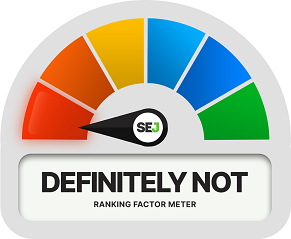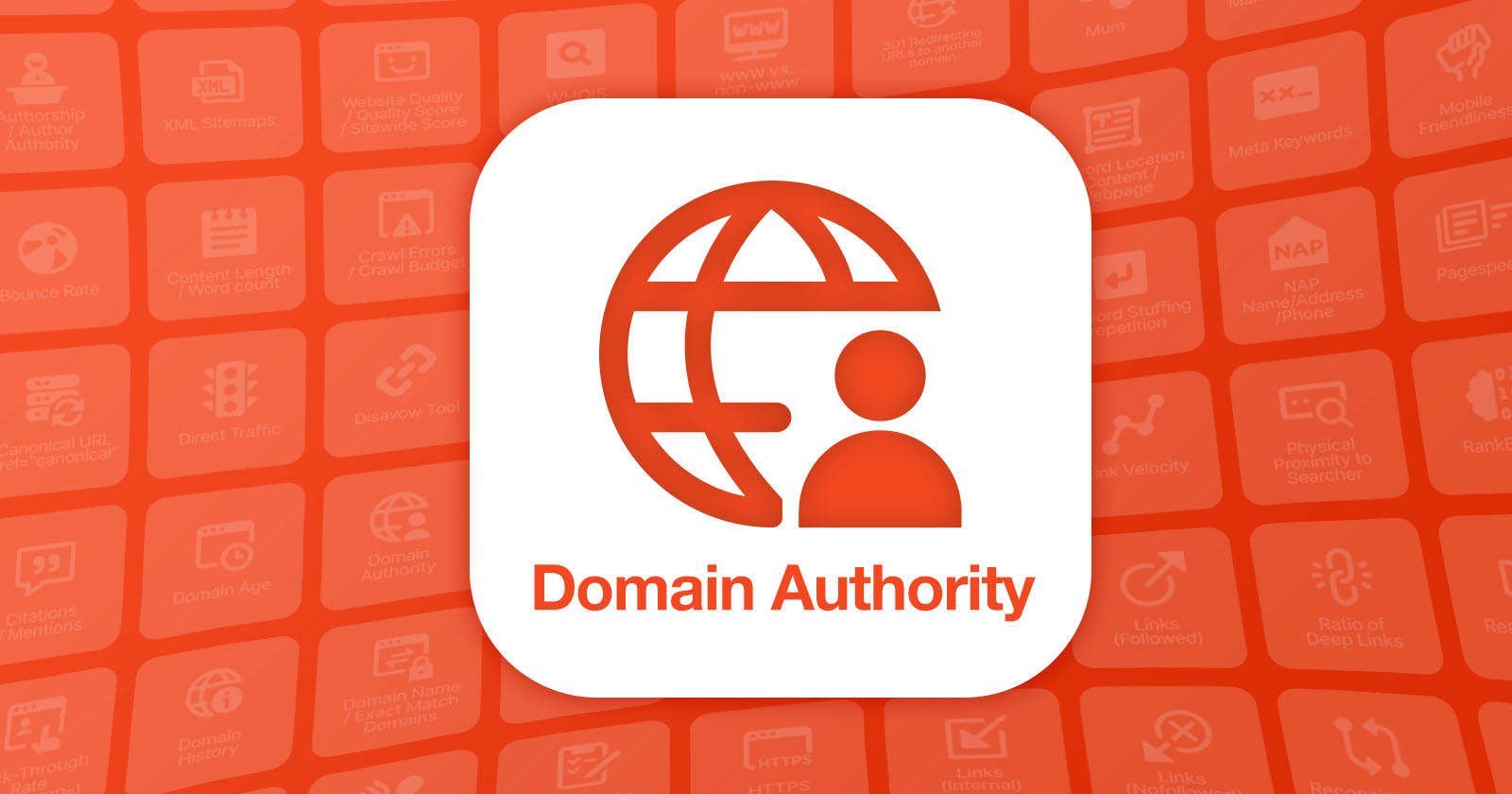Many companies and marketers believe that Domain Authority is a big deal.
There are guides everywhere about how you can boost your website’s Domain Authority for better rankings in search results.
But does a higher Domain Authority actually result in better rankings?
In this chapter, we will explore what Domain Authority is and the evidence as to whether it is a Google ranking factor.
[Ebook:] Download The Complete Google Ranking Factors Guide
What Is Domain Authority?
To understand whether Domain Authority is a part of the Google algorithm, first, we must understand what Domain Authority is.
First, there is domain authority – the concept – and Domain Authority (DA), the metric by Moz.
As VentureSkies describes it, the general definition of domain authority is as follows:
“The domain authority of a website describes how important the site is for a specific targeted subject area [and] relevance with respect to … search words..”
Then, there’s Moz’s Domain Authority or DA score, which defines the metric as “…a search engine ranking score developed by Moz that predicts how likely a website is to rank in search engine result pages (SERPs).”
Domain Authority by Moz is calculated using dozens of factors, including the number of linking root domains and the total number of links. The score itself is displayed on a 100-point scale.
It’s worth noting that Moz is not the only SEO platform that has developed a metric for measuring website authority. You will also find that:
- Ahrefs has an Ahrefs Rank and Domain Rating. AR ranks websites in the Ahrefs database by the size and quality of their backlinks, while Domain Rating shows the strength of a website’s backlink profile compared to others in the Ahrefs database on a 100-point scale.
- Semrush has an Authority Score that measures the overall quality and SEO performance of a domain or webpage.
- Majestic has Flow Metric Scores that measure the number of links a website has and the quality of the website’s content.
The Claim: Domain Authority As A Ranking Factor
Many articles discussing Domain Authority refer to it as a search engine ranking score and suggest it is a good predictor of how well a website will perform in SERPs for targeted keyword phrases.
This can lead some to believe that Domain Authority is a ranking factor for search engines like Google.
There is even an interesting Twitter thread in 2020 from the co-founder of Moz, Rand Fishkin, showing internal documents from Google, suggesting Google does have a domain authority-like metric.
But continue reading – the evidence becomes clear.
[Discover:] More Google Ranking Factor Insights
Domain Authority As A Ranking Factor: The Evidence
Moz’s website says its Domain Authority score does not impact Google search results.
“Domain Authority is not a Google ranking factor and has no effect on the SERPs.”
In 2015, Gary Illyes, Chief of Sunshine and Happiness at Google, was asked about authority passing from HTTP to HTTPS. His response:
“We don’t have “authority”, but signals should pass on, yes.”
In 2016, Illyes answered a question about whether adding or removing pages from a website affected its domain authority.
“so, my problem is that I don’t know of anything in ranking that would translate to “domain authority”, so can’t answer”
A few weeks later, during a discussion about linking to image files or webpages for an impact on domain authority, Illyes replied:
“We don’t really have ‘overall domain authority’. A text link with anchor text is better though”
From there, you will find many confirmations from John Mueller, Search Advocate at Google, that Domain Authority exists but that Google doesn’t use it.
In December 2016, Mueller responded to a comment about a desktop domain having higher authority.
“Google doesn’t use ‘domain authority’”
In 2018, someone asked if Domain Authority existed on a Reddit AMA with Mueller.
Mueller’s response acknowledged that:
“Of course it exists, it’s a tool by Moz.”
Later that year, when asked on Twitter if Domain Authority existed – again – Mueller responded:
“‘Domain Authority (DA) is a search engine ranking score developed by Moz’ so exists = yes. Search engines don’t use it.”
In 2019, when asked about a site-wide metric similar to Domain Authority on Twitter, Mueller answered:
“We don’t use domain authority. We generally try to have our metrics as granular as possible, sometimes that’s not so easy, in which case we look at things a bit broader (eg, we’ve talked about this in regards to some of the older quality updates).”
Later that year, a Twitter user asked if a drop in search engine traffic was due to a loss in Domain Authority. Mueller replied:
“We don’t use domain authority, that’s a metric from an SEO company. I’d recommend starting a thread in the help forum with the details, including the URLs & queries you’re seeing changes in.”
In 2020, Mueller received another question about domain authority. This time, someone asked if backlinks from high domain authority websites matter in website rankings. His response:
“We don’t use domain authority at all in our algorithms.”
A few months later, Mueller was asked how important Domain Authority was to crawling webpages faster on Twitter.
“Just to be clear, Google doesn’t use Domain Authority *at all* when it comes to Search crawling, indexing, or ranking. This is pretty clear on their site.
We do, however, index tweets that talk about it.”
Up until that point, Google representatives seem clear that there is no use of Domain Authority. However, in a late 2020 interview with SearchLove, Mueller was quizzed on whether Google had a domain authority-like metric.
Unlike the ones before, this answer hints at a possible DA-like metric in Google’s algorithm.
“I don’t know if I’d call it authority like that, but we do have some metrics that are more on a site level, some metrics that are more on a page level, and some of those site-wide level metrics might kind of map into similar things.”
In 2022, Mueller answered another question about Domain Authority on Reddit. The question was how to increase a website with a Domain Authority of 31. Mueller answered:
“I’m kinda torn. On the one hand, you do not need DA for Google Search. Google doesn’t use it *at all*. If you’d like to level your site up in search, you’d need to focus on something else, or at least use other metrics for it. This is mostly why DA as a metric is frowned upon by many SEOs. For context, I don’t think I’ve ever looked up the DA for a site in the 14 years I’ve been doing this.”
He offered additional advice on how one could improve a domain’s authority by focusing on a topic with low competition and creating “…a reasonable collection of fantastic content” about that topic.
He emphasized that user signals, not any kind of authority score, would be what moves the needle.
[Recommended Read:] Google Ranking Factors: Fact or Fiction
Domain Authority As A Ranking Signal: Our Verdict

Domain Authority (DA) by Moz is similar to Domain Rank (DR) by Ahrefs, the Semrush Authority Score, and Flow Metric Scores by Majestic.
They are all authority metrics calculated by third-party tools that have no actual effect on search engine rankings.
While Mueller once suggested that Google has metrics that map into similar things as Domain Authority, he has repeatedly denied the use of Domain Authority by Moz on Twitter and Reddit.
He also noted that they don’t call anything they do internally “domain authority.”
Therefore, we can conclude that Domain Authority is definitely not a ranking factor.
Featured Image: Paulo Bobita/Search Engine Journal




